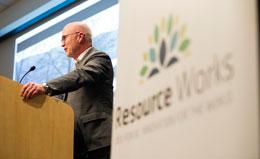Creating a blueprint for post-pandemic prosperity

A Task Force representing over a quarter of a million businesses and over 3 million workers across Canada plans to draw up a blueprint for Canada's economic recovery as the country emerges from the COVID-19 crisis.
The national Task Force for Real Jobs, Real Recovery is supported by a coalition of over 25 industry associations, unions, professional organizations and Indigenous organizations representing the energy, manufacturing, transportation, forestry and construction sectors.
The Task Force is being convened by Resource Works, a non-partisan, not-for-profit organization committed to the development of Canada's resources in a manner that is inclusive of Indigenous peoples and maintains a clean and healthy environment.
Resource Works Executive Director Stewart Muir said Canada has to keep its competitive edge to create jobs in the post-pandemic recovery.
"Canada must not only maintain our competitive advantages, but also actively leverage them in the recovery effort," said Muir.
"Chief among these is our capacity to produce low-emissions natural resource commodities under robust environmental, social and governance conditions. These are key components of a broader resource ecosystem that is the engine of Canada's future."
After the Task Force completes its package of policy measures, it will present its recommendations to key federal government decision-makers, as well as to the Industry Strategy Council, a federal initiative launched in response to the economic effects of COVID-19.
"Government leaders have been asking for ideas, and we are responding," said Muir.
"Resource industries are rising to the challenge of articulating a future that shows they understand society's high expectations and are providing meaningful solutions. I'm persuaded that all Canadians can be inspired by the incredible possibilities for natural resource activities and products to enrich our lives and protect the environment, and I look forward to discussing this with others."
Finance Minister Bill Morneau's recent fiscal snapshot showed the federal government's deficit is expected to hit $343 billion this year.
As a result, job growth will likely be uneven and slow, while whole sectors will remain effectively mothballed, maybe well into 2021. Rebuilding our economy to address these challenges means identifying areas of real opportunity—and pursuing them.
"Fortunately, we already know where we have unassailable strategic advantages," said Muir.
"It will make sense to start the recovery efforts by targeting areas where markets are already waiting for the goods and services that result from people getting back to work.”
"We can't simply return to 'Business as Usual.' We need a proactive, dynamic and positive approach that empowers Canadians in the short- and long-term."









